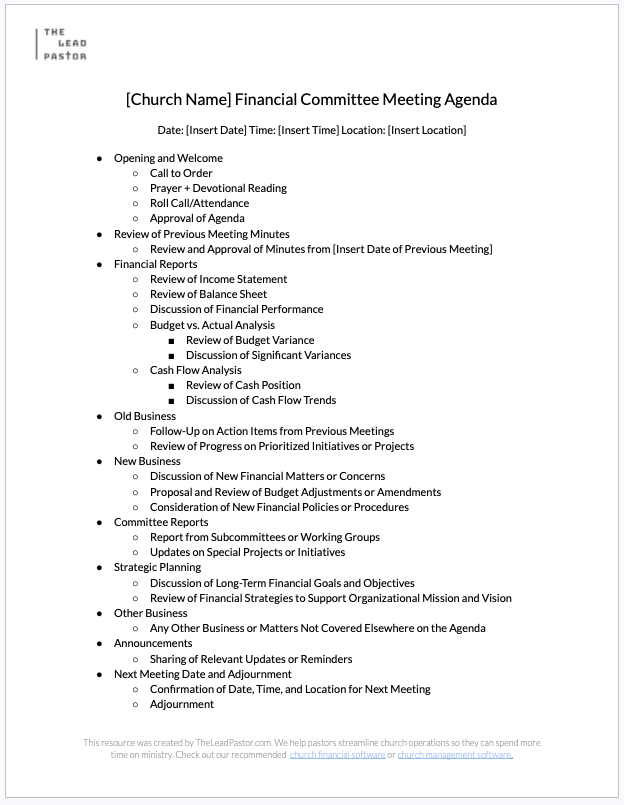When a church financial committee works well, financial decisions are made quickly. Communication is clear and regular. Financial planning is consistent and effective. Sadly, many pastors have an altogether different experience with their church finance committee:
- Unclear, incomplete, or infrequent financial reports
- Frequent overspending or underspending
- Financial decisions are often postponed or rushed
- Persistent disagreements or lack of unity
- Consistent failure to meet financial goals
These symptoms can indicate deeper issues (such as poor planning, lack of trust in the church, ineffective structure, etc) that, left unsolved, will derail your church.
While there are some excellent software tools to help manage church finances, We'll unpack how a well-run finance committee can:
- Increase your church's community impact
- Lighten your pastoral load
- Protect your church's legal well-being
- Bring direction and momentum to your church's financial health
In this article, I tag-teamed with Jim Gordon, a senior pastor with 25+ years of experience leading staff, growing ministries, and impacting the community. Together, we dive into the ins and outs of church finance committees.
We'll provide some downloadable resources as well: a sample finance committee meeting agenda, and a template for onboarding new members of your church finance committee.
Definition: What Is A Church Finance Committee?
In broad terms, the church finance committee:
- protects the church legally, ensuring compliance with legal and financial regulations.
- provides direction in setting budgets, overseeing spending, investments, etc.
- sets policy governing security and operations
It's a multifaceted role that requires diligence, expertise, and a commitment to the church's financial health and integrity. This encompasses a range of duties, including budgeting, financial planning, monitoring income and expenses, ensuring compliance with financial regulations, and maintaining transparency with the congregation.
Depending on your church and denomination, the structure and functions of a church finance committee may vary slightly:
- They may be known by different names such as Board of Directors or Deacons.
- Requirements for decision-making may differ (ie: unanimous vs majority.)
- Finance committees might typically report directly to the pastor, the congregation, or the denomination.
Ideally, your church finance committee should ensure the church's vision and values are reflected in the church operations.
Remember; those who control the finances will hold significant influence, so it's important to ensure that the vision and values of the church remain the primary focus. While administration and finances are crucial, they should not overshadow the overarching mission and purpose of the church.
The church finance committee must protect the interests of the church as a whole. Do not form your board of directors or finance committee solely from representative interest groups, such as the youth ministry, or worship team. If you do, you're opening the committee to competing priorities.
Jim Gordon, senior pastor
Functions: Why Do You Need A Church Finance Committee?
Practically speaking, the function is fairly clear: to protect and direct the church.
- Ensure the church is compliant with legal and financial regulations
- Set annual budget, carry out risk assessment/management, financial forecasting
- Aligning policies and procedures with the church's vision and values
A church needs a financial committee to provide oversight and biblical stewardship of its financial resources. This committee ensures that funds are managed responsibly, transparently, and in accordance with the church's mission and values. By involving dedicated members in financial decision-making, the church can promote accountability, foster trust within the congregation, and sustain its long-term financial health and stability.
However, the finance committee is critical for another reason as well. Jim Gordon says, "Make sure that you as the lead pastor are not the only one who's carrying the financial load. Don't be alone in that - it's too big a burden for any one person to carry."

Acts 6 offers some great insight into this. In this passage, the apostles separate the roles of spiritual leadership from operational leadership. Jesus’s disciples, the leaders of the newly formed church, recognized the importance of having the right people in the right roles.
The apostles needed to focus on teaching the new church, so they commissioned deacons to oversee the operations of the church. Similarly, it’s important for you as the lead pastor to ensure that you have the right people in the key roles that allow your church to function as smoothly as possible.
Duties: What Does a Church Finance Committee Do?
From budgeting to compliance, the responsibilities of the finance committee are vital and diverse. Here are some of the primary ones:
Set Church Revenue Projections
This task involves estimating the expected income that the church will receive over the next year and then providing a framework for church budgeting and resource allocation. This might look like...
- examining past giving trends to predict future income, taking into account yearly giving patterns.
- anticipating how changes in membership, attendance, or the economy might affect revenue.
- Work with pastors, elders, and other ministry leaders to forecast upcoming expenses and funding needs.
Create an Annual Church Budget
By carefully considering the needs of each ministry team and having a clear understanding of the church's income and expenses, the finance committee will craft a budget. The specifics will vary, depending on the method you use to track finances (ie: via church fund accounting ). This budget should be practical and suitable for the church - while executing on its vision and values.
- Assess Financial Needs: Review expenses like salaries and maintenance.
- Prioritize Spending: Decide where money will best meet your goals and vision.
- Allocate Funds Wisely: Spread resources strategically among ministries.
Stewardship for Emergencies
Being ready for emergencies within our church entails prudent planning and management to prepare for unexpected spending or being ready to respond to urgent needs within the church community. A few examples of this:
- Establish Emergency Fund: Allocate funds in the budget for unexpected expenses.
- Review Insurance: Ensure adequate coverage for emergencies.
- Develop Contingency Plans: Create protocols for various emergencies.
Financial Reporting
The wise decision-making and leadership that we are called to is built on clear, sound information–so creating church financial reports is a critical aspect of the church finance committee. This involves preparation and reporting of accurate and transparent financial information. Thrilling stuff? Not usually. Critically important? Always.
Safeguard Church Assets
Protecting the resources and property owned by your church is a big part of stewardship. This duty involves implementing measures or policies to prevent the loss, theft, or misuse of assets, ensuring their security and longevity.
Ensure Proper Compliance
This duty involves ensuring that your church complies with all relevant laws, regulations, and financial standards. It entails keeping your church informed about financial regulations, retaining financial records according to IRS guidelines, keeping abreast of tax law & reporting requirements, and other legal obligations.
Generally speaking, if you can recruit an experienced accountant to the finance committee to oversee this, you'll be in good shape. This is a difficult, nuanced role for an inexperienced or untrained individual. If you don't have access to that - it's worthwhile consulting an expert. This is one area where errors can be extremely costly.
Oversee Policy Development
Creating and implementing financial policies and procedures will be immensely beneficial for your church. When done well, they will provide clear guidelines and protocols that safeguard your church.
- Identify Needs: Assess financial challenges to determine policy areas.
- Research: Look into best practices from other churches if necessary.
- Collaboration: Work with church leaders and finance professionals.
- Clarity: Write policies in clear language accessible to all.
- Regular Review: Update policies regularly to stay relevant.
Now it is required that those who have been given a trust must prove faithful.
1 Corinthians 4:2 (NIV)
Key Positions: What Are the Key Church Finance Committee Roles?
Remember, the people who hold the purse strings of an organization wield enormous influence. It’s better to have only a few excellent people than to fill a quota with mediocre folks.
Further: it's critical that you're absolutely sure that those trusted to oversee the financial health of the church are trustworthy themselves, and already investing with their time and money.
Your church finance committee or board of directors need to fill the following roles (note: smaller churches may have multiple roles filled by the same person.)
Chairperson
The Chairperson of your church finance committee is the facilitator. They lead meetings, oversee the committee's work, encourage teamwork among members, and help to ensure that all the committee’s financial decisions match your church's vision and goals.
The chairperson should have strong communication skills. Ensure they have good communication with other committee members, listen to their ideas, and give clear directions. By making sure the team is working well together and communicating clearly, they can lead the committee in making wise financial choices that will help your church grow!
Financial Secretary
The financial secretary’s main role is facilitating communication among committee members. They help document meeting minutes, organize essential documents, and ensure the smooth operation of the entire finance committee. Usually, the secretary handles correspondence, manages documents, and helps with scheduling/coordinating meetings. In some churches, the secretary is the point person for church leadership.
You want to have a Financial Secretary who has a strong attention to detail. They will need to accurately keep records of church tithes, be highly organized, and need to communicate regularly with the whole finance committee.
Church Treasurer
The Church treasurer oversees all the management of the church spending. They are responsible to oversee the day to day financial operations of the church (including managing the bookkeeper, if necessary.) In addition, they are typically responsible for:
- Financial Reporting: They prepare reports and financial statements about the church's finances and present them to the financial secretary and committee.
- Point Person for Government/Banks: Typically, the Church Treasurer should be well-versed in the financial and legal regulations relevant to your church. They serve as the point person for your church, and may need to communicate with the IRS (or CRA in Canada) on behalf of the church.
- Long-Term Planning: They participate in strategic financial planning and decision-making to support the long-term financial health and sustainability of the church.
Bookkeeper
The bookkeeper typically handles the day-to-day recording of financial activities, providing the required financial information that the committee will need in managing church finances. In many small/mid-size churches, the Bookkeeper and theTreasurer positions overlap. The bookkeeper also generally handles the following responsibilities:
- Record Keeping: Maintain detailed and accurate records of all financial transactions, including donations, expenses, and income.
- Data Entry: Enter financial data into applicable accounting software (which offer a ton of benefits to churches) or spreadsheets, ensuring accuracy and consistency in recording.
- Reconciliation: Reconcile bank statements and financial accounts regularly to identify discrepancies and ensure accuracy, especially for donation receipts and tax purposes.
- Reporting: Assist in the preparation of financial reports, including balance sheets, income statements, and cash flow statements, for review by the finance committee and church leadership.
Template: Church Finance Committee Meeting Agenda
A well-organized business meeting agenda is important for ensuring productive discussions and effective decision-making regarding your church’s finances. We've created a customizable, downloadable agenda (in .docx format) that contains the key items that should be included to make the most of your committee meetings:

Template: Adding New Church Committee Members
What kind of process do you need to have for identifying, interviewing, and onboarding potential members of your board or finance committee? This question is crucial. Jim and I discuss it here:
Our conversation touches on...
- The four qualifications (organization, time, development, spiritual)
- The onboarding process, from identifying prospective members, to internal vetting, qualifying interviews, and finally, term length.
- Board selection for churches with a smaller pool of prospects
- Choosing candidates with character, whose vision and values align with your church.
The backbone of the process that Elora Road Christian Fellowship (and many others) is an Onboarding Booklet - a document provided to potential leadership candidates.
We've developed template booklet for you and your church to use to ensure that the folks church to use for onboarding folks who are joining your church finance committee (or board of directors.) It includes the following:
- Introductory letter from the pastor
- Qualifications necessary for leadership
- Required commitments (time, organizational, spiritual, and development)
- Selection process
- Vision/Mission Statements
- Interview Questions
The document is ten pages, and is in the .docx format, so it is fully customizable.

Additional Tools to Support Your Church Finance Committee
At TheLeadPastor, we've been scouring the world of church software for the best, most effective solutions for churches like yours. I want this website to help you streamline your church operations, allowing you to spend more time and energy doing ministry.
Here are a handful of software solutions that could help support the work of your church finance committee:
- Streamline tracking donations and expenses with these excellent church finance software options.
- Manage your church facility and maintenance with our picks of available church facility management software.
- Manage budgets and organizational finances with the best church accounting software we could find.
A Final Word of Encouragement
It's easy to get sidetracked or stressed out when it comes to church financial management. This mission of church building we are on is an important one - and your calling is a unique one. As pastors, we live with the constant pressure to perform, to excel, to deliver results... but I implore you to keep this truth front and center in your mind:
I will build my church, and the gates of hell will not prevail against it.
Jesus, mark 16:19
Jesus is building His church. The results we want to see are, ultimately, not OUR responsibility. Rather, they will come as we trust Jesus to work through us... and Jesus has a vested interest! He is working within you. Look to Him for the courage, humility, and perspective to work closely with your church finance team.
Stay Connected!
Subscribe to TheLeadPastor Newsletter for more insights and encouragement from veteran pastors (like Jim Gordon and others.) We're on a mission to simplify church operations for pastors so they can spend more of their time and energy doing ministry.
Join us - we'd love to have you.



